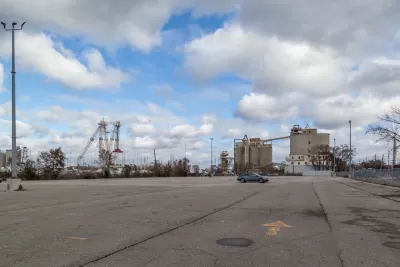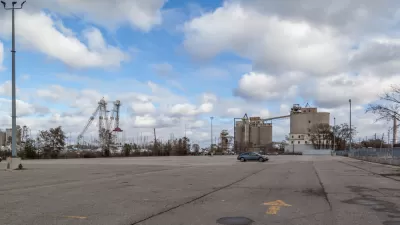After Alphabet-owned Sidewalk Labs dropped the project, Toronto is evaluating other proposals for redeveloping their waterfront.

Four design teams have been shortlisted to redevelop Toronto's Quayside, reports Donovan Vincent, each with their own unique vision for "the future of the empty 12-acre parcel of land that Google sister company Sidewalk Labs abandoned last year." After unveiling an ambitious plan for a 190-acre "tech-driven neighborhood," Sidewalk Labs drastically scaled back the 'smart city' project after encountering public opposition, then ended their involvement altogether in May 2020, citing financial concerns.
The winning team will be selected next year by Waterfront Toronto, and local advocates hope the winning design will "include public connections to the waterfront as well as vibrant spaces for recreation and cultural events," reports Vincent, in addition to condos and commercial spaces.
Vincent details the four teams and their past projects and accomplishments, which include the Smithsonian’s Museum of African American History and Culture, Montreal's New Vic, and Amsterdam’s Silodam housing. An evaluation committee consisting of senior managers with Waterfront Toronto and representatives from the city and CreateTO "will make recommendations to a steering committee, which in turn will make a recommendation to Waterfront Toronto’s board of directors," Vincent writes.
The collapse of the Sidewalk Labs proposal could be a bellwether for 'smart city' projects, which promise to improve the efficiency, transparency, and functionality of cities through data and technology. Some critics see this algorithmic, data-drive approach as incompatible with the glacial pace of civic bureaucracy and the unpredictable nature of human behavior.

Study: Maui’s Plan to Convert Vacation Rentals to Long-Term Housing Could Cause Nearly $1 Billion Economic Loss
The plan would reduce visitor accommodation by 25,% resulting in 1,900 jobs lost.

North Texas Transit Leaders Tout Benefits of TOD for Growing Region
At a summit focused on transit-oriented development, policymakers discussed how North Texas’ expanded light rail system can serve as a tool for economic growth.

Using Old Oil and Gas Wells for Green Energy Storage
Penn State researchers have found that repurposing abandoned oil and gas wells for geothermal-assisted compressed-air energy storage can boost efficiency, reduce environmental risks, and support clean energy and job transitions.

Santa Barbara Could Build Housing on County Land
County supervisors moved forward a proposal to build workforce housing on two county-owned parcels.

San Mateo Formally Opposes Freeway Project
The city council will send a letter to Caltrans urging the agency to reconsider a plan to expand the 101 through the city of San Mateo.

A Bronx Community Fights to Have its Voice Heard
After organizing and giving input for decades, the community around the Kingsbridge Armory might actually see it redeveloped — and they want to continue to have a say in how it goes.
Urban Design for Planners 1: Software Tools
This six-course series explores essential urban design concepts using open source software and equips planners with the tools they need to participate fully in the urban design process.
Planning for Universal Design
Learn the tools for implementing Universal Design in planning regulations.
Ascent Environmental
Borough of Carlisle
Institute for Housing and Urban Development Studies (IHS)
City of Grandview
Harvard GSD Executive Education
Toledo-Lucas County Plan Commissions
Salt Lake City
NYU Wagner Graduate School of Public Service




























